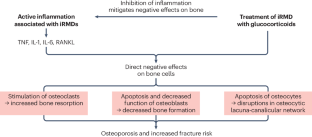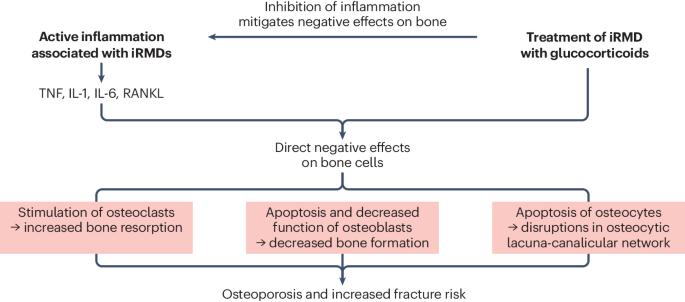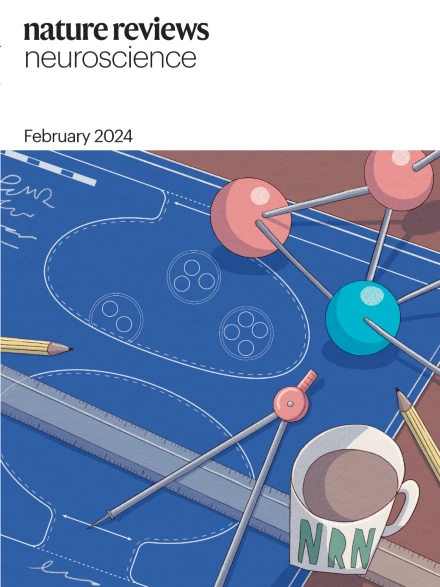炎症性风湿病患者骨质疏松症和骨折风险是多因素造成的
IF 29.4
1区 医学
Q1 RHEUMATOLOGY
引用次数: 0
摘要
类风湿性关节炎、结缔组织病、血管炎和脊柱关节病等炎症性风湿病和肌肉骨骼疾病(iRMDs)患者发生骨质疏松症和骨折的风险高于非 iRMDs 患者。针对 iRMDs 骨质疏松症的研究和管理建议通常将糖皮质激素作为最相关的风险因素,但在很大程度上忽略了与疾病相关的一般风险因素。然而,iRMD 骨质疏松症的病因发病机制是多方面的,包括疾病活动导致的局部和全身炎症对骨骼健康的负面影响、残疾或营养不良(如系统性硬化症中的吸收不良)等其他 iRMD 特异性风险因素,以及年龄增长和更年期导致的荷尔蒙流失等一般风险因素。此外,可降低骨折风险的因素,如体育锻炼、健康营养、补充维生素 D 和充分治疗炎症等,在 iRMD 患者中的存在情况也不尽相同。与骨质疏松症的一般和 iRMD 特异性保护因素和风险因素有关的证据表明,"糖皮质激素诱发的骨质疏松症 "这一既定且经常使用的术语过度简化了 iRMDs 患者所遇到的复杂的相互关系。这些患者的骨质疏松症应被描述为 "多因素"。因此,需要采用多模式方法来治疗骨质疏松症。这种方法应包括优化控制疾病活动、尽量减少使用糖皮质激素、抗骨质疏松药物治疗、提供体育锻炼和营养建议、预防跌倒以及管理其他风险和保护因素,从而改善这些患者的骨骼健康。本文章由计算机程序翻译,如有差异,请以英文原文为准。


Osteoporosis and fracture risk are multifactorial in patients with inflammatory rheumatic diseases
Patients with inflammatory rheumatic and musculoskeletal diseases (iRMDs) such as rheumatoid arthritis, connective tissue diseases, vasculitides and spondyloarthropathies are at a higher risk of osteoporosis and fractures than are individuals without iRMDs. Research and management recommendations for osteoporosis in iRMDs often focus on glucocorticoids as the most relevant risk factor, but they largely ignore disease-related and general risk factors. However, the aetiopathogenesis of osteoporosis in iRMDs has many facets, including the negative effects on bone health of local and systemic inflammation owing to disease activity, other iRMD-specific risk factors such as disability or malnutrition (for example, malabsorption in systemic sclerosis), and general risk factors such as older age and hormonal loss resulting from menopause. Moreover, factors that can reduce fracture risk, such as physical activity, healthy nutrition, vitamin D supplementation and adequate treatment of inflammation, are variably present in patients with iRMDs. Evidence relating to general and iRMD-specific protective and risk factors for osteoporosis indicate that the established and very often used term ‘glucocorticoid-induced osteoporosis’ oversimplifies the complex inter-relationships encountered in patients with iRMDs. Osteoporosis in these patients should instead be described as ‘multifactorial’. Consequently, a multimodal approach to the management of osteoporosis is required. This approach should include optimal control of disease activity, minimization of glucocorticoids, anti-osteoporotic drug treatment, advice on physical activity and nutrition, and prevention of falls, as well as the management of other risk and protective factors, thereby improving the bone health of these patients. In this Review, the authors argue that the risk of osteoporosis in patients with inflammatory rheumatic and musculoskeletal diseases (iRMDs) is multifactorial, with contributions from iRMD-specific factors, comorbidities, general risk factors and the effects of iRMD therapies such as glucocorticoids.
求助全文
通过发布文献求助,成功后即可免费获取论文全文。
去求助
来源期刊

Nature Reviews Rheumatology
医学-风湿病学
CiteScore
29.90
自引率
0.90%
发文量
137
审稿时长
6-12 weeks
期刊介绍:
Nature Reviews Rheumatology is part of the Nature Reviews portfolio of journals. The journal scope covers the entire spectrum of rheumatology research. We ensure that our articles are accessible to the widest possible audience.
 求助内容:
求助内容: 应助结果提醒方式:
应助结果提醒方式:


